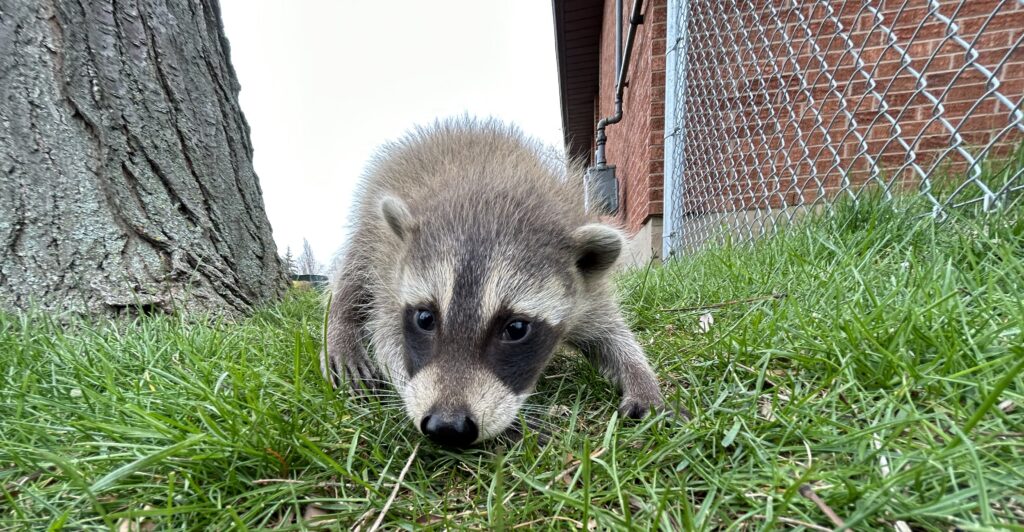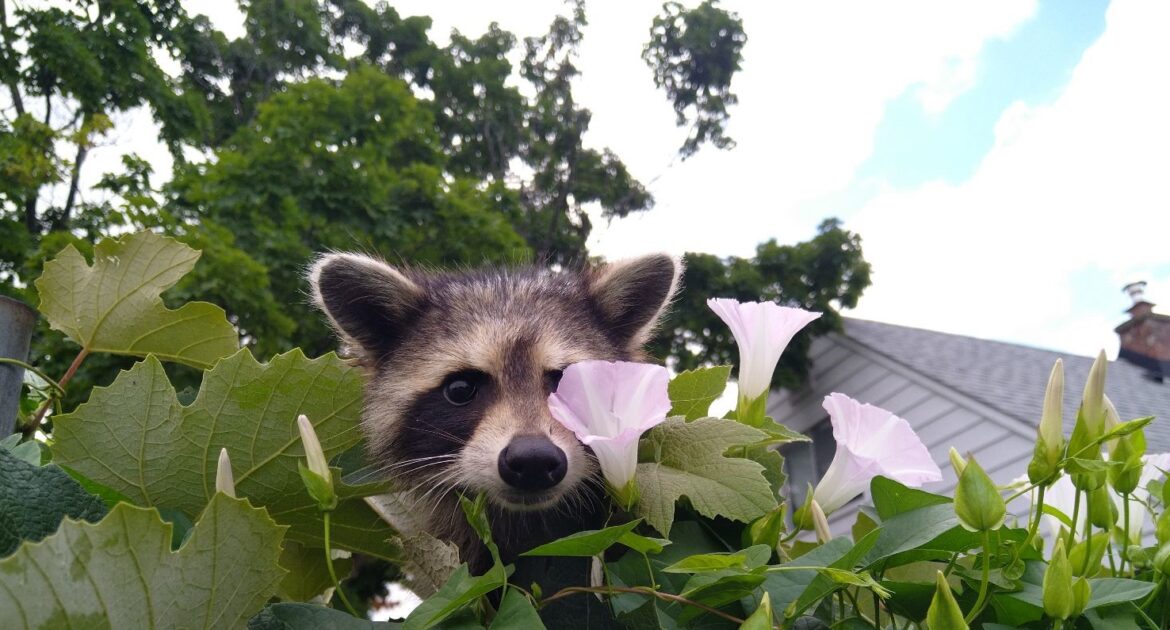Every homeowner knows the drill. As temperatures start to climb, signs of unwanted visitors begin to appear in carefully cultivated landscapes. Yes, the seekers of flowers and fruit have once again come calling. As the days grow longer, these pesky intruders are on a mission – to find a mate and to feast. Their appetite for greenery can cause havoc and headaches during what some wildlife enthusiasts refer to as ‘raccoon mating season.’
Deciphering their modus operandi, foreseeing their habit trails, and adapting to their dining and dashing tendencies require patience and tenacity. This handy guide is here to lend you a hand, offering you practical and effective solutions to safeguard your garden.
Knowledge is power when it comes to wildlife management. Understand their behaviour pattern, learn when the raccoon baby season starts, and take prompt action. This way, you can ensure your garden thrives, irrespective of the season.’
Here’s a taste of what lies ahead: unmasking the subtle signals of a raccoon problem, a detailed walkthrough on the process of raccoon removal in Toronto during mating season, the potential long-term effects of such an infestation, and the benefits of hiring a professional wildlife technician for the task.
What Do You Need to Know About Raccoon Mating Season?
When do raccoons have babies? It’s crucial to understand the patterns surrounding raccoon breeding. The reproduction timeline paints an essential part of the broader picture of how to effectively safeguard your vegetation from these creatures.
- Raccoon mating actually occurs during the winter months, typically between January and March, with females giving birth to a new litter approximately 65 days later. This tidbit is key in understanding when baby raccoons, or kits, might start appearing on your property.
- Female raccoons usually only have one litter per year. The size of these litters can vary, but typically they consist of 2-5 young ones.
- You’ll seldom see the young ones immediately after birth as they mostly stay in their dens for the initial weeks. This behaviour can complicate efforts of humane wildlife removal.
- Naturally nocturnal, these creatures often engage in their activity during the night. However, during mating season, you might notice an abrupt increase in their daytime activity. This trend provides homeowners with a clear indication of the presence of these pests in the vicinity.
Underlining the behavioural traits of these mammals during their breeding time can equip you with the knowledge you need to anticipate potential invasions and plan your actions accordingly. Good timing can be especially vital when dealing with a pesky animal that has just given birth in your yard or sheltered vicinity. While rescue is the humane path, ensuring it’s done while causing as little distress to the animals as possible can go a long way in protecting your garden effectively.
Where Do You Find Raccoons on Your Property During Mating Season?
As homestead lovers, one of the common challenges is finding woodland creatures, specifically of the raccoon variety, lurking about during their breeding cycle. Here are some common places on your property where you’re likely to find them:
- Attics: Offering shelter and warmth, attics are some of the most likely spaces for raccoons to nest during this busy time.
- Garages: Like attics, garages provide an enclosed, protected environment that raccoons find desirable.
- Chimneys: An unconventional, yet common spot for raccoon nesting is your chimney, which offers warmth and a safe retreat. Keeping chimney flues secured and utilizing wildlife-proof caps can help in the prevention.
- Under Decks and Sheds: These areas offer ample protection from the elements, making them ideal hideouts during their reproductive cycle.
Understanding the common places these pesky intruders might seek refuge is the first step to creating a proactive wildlife protection plan for your garden.
What are the Signs of a Raccoon Infestation in Your Garden?
Unwanted, nocturnal visitors can cause havoc to your beautifully curated green spaces. It’s key to remain vigilant, especially during the temperate seasons when unwanted guests, like raccoons, often breed. Pesky creatures like raccoons use gardens as their playgrounds and food hunting ground, but no worries, we’ll guide you on how to identify if your garden is an uninvited visitor’s abode.
- Nocturnal Noises: Being night creatures, active noises during the twilight hours in your garden or attic can be a sign of them.
- Upturned Trash Bins: If you find your trash bins in a mess every morning, it could be them searching for food. They are notorious for causing garbage disarray.
- Footprints: Look out for unique hand-like footprints on your lawn or around the garbage area. This could denote a regular visitor.
- Damage to Home Exterior: Scratches on your walls or chewed wires are a ‘red flag’ indication.
- Uncovered Holes: Discovering dug-out areas in your yard or around your property is often a sign of nesting activity.
Spotting these signs early can play an instrumental role in safeguarding your garden from these unwanted guests. Remember, try to avoid handling these pesky invaders on your own. Professionals are just a call away to help protect your beloved green spaces. Stay alert, and let’s keep our gardens safe and serene.
What are the Potential Long-Term Impacts of Raccoon Infestations?
Dealing with these wildlife could potentially manifest adverse effects if the issue is left unchecked. From property damage to the possibility of disease transmission, the repercussions are far-reaching, and understanding them is crucial in your efforts to safeguard your home and garden. Below are some of the possible long-term impacts:
- Physical Damage: Raccoons are known to cause extensive destruction to your property. This includes digging up your garden or lawn in search of food, tearing up insulation, and damaging structures.
- Disease Transmission: These animals are carriers of various diseases such as rabies, leptospirosis, and roundworms that could potentially pass on to humans and pets.
- Waste Accumulation: Droppings and urine from these creatures not only emit a foul smell but could also pose health risks as they can harbour disease-causing organisms.
- Loss of Crops: If you’re a gardening enthusiast, these unwanted visitors can wreak havoc on your plantations, resulting in significant losses for both crops and ornamental plants.
Dismissing a raccoon situation as a mere pest nuisance might lead to unwanted circumstances. The need for effective management becomes clear when you understand all that is at stake. Doing a routine check during the moody mating season could save you from potential headaches down the line. Even seemingly trivial signs like common tracks or disrupted garbage should not be ignored – this is where professional wildlife removal comes in. The next sections elaborate on the solutions.

What are the Effective Methods to Get Rid of Raccoons from Your Garden?
Wondering how to get rid of raccoons? Eliminating the relentless intruders – raccoons, from your garden can seem like a daunting task. But fear not; we are here with effective and practical methods to help you wage a successful defence against these scurrying invaders. Here’s how:
- Securing Garbage Bins: Raccoons forage for food, and unsecured trash containers are their delight. Using durable, raccoon-proof bins can help reduce their interest in your property.
- Sprinklers and Lights: These mask-faced animals shy away from bright areas and unexpected bursts of water. Install automatic security lights and motion-activated sprinklers as preventative measures.
- Pets: In the presence of pets such as dogs, these unwanted guests may rethink their decision to intrude on your garden space.
- Fencing: High fences can be an effective deterrent. However, remember, raccoons are excellent climbers. So, an electric fence or roller bars at the top may be a wise addition.
- Professional Assistance: Enlisting expert help for wildlife removal can be the ultimate solution, enabling you to regain control of your garden quickly and safely.
Preserving the beauty and harmony of your garden requires constant vigilance, particularly during the busy raccoon season. Though pesky, remember that raccoons are a crucial part of our ecosystem. Therefore, removal strategies should be humane and non-lethal. Exclusion over extermination is always the best pathway forward.
What are the Benefits of Hiring a Professional Wildlife Technician for Raccoon Removal?
Having troublesome intruders in your garden can be a nightmare. These pests, specifically raccoons, can damage your property and pose potential health hazards. That’s where professional wildlife technicians come in handy. Let’s delve into the fundamental advantages of seeking their expertise:
- Expertise and Experience: Wildlife technicians are skilled in identifying and solving wildlife infestation problems. They couple in-depth knowledge of animal behaviour with scientific principles to oust these pesky creatures from your property.
- Humane Practices: Professionals in the field are equipped with the skills to handle wildlife intrusions responsibly and humanely, ensuring minimal harm to the animals.
- Long-Term Solutions: These experts do not just remove them; they also provide robust solutions to prevent future reoccurrences. This includes sealing potential entry points, suggesting landscaping changes, and providing education about nuances like the raccoon mating season.
- Safety: Technicians take safety seriously. From possession of necessary protective gear to vaccination against possible diseases, they are trained to manage the job without endangering themselves or the homeowners.
- Saved Time and Energy: Engaging a professional wildlife technician saves you the time, energy and frustration of trying to combat the infestation on your own.
Engaging the services of a professional wildlife technician like Skedaddle provides a host of benefits. They make the process of removal less daunting and more efficient, and most importantly, they ensure that your garden is well-protected and can thrive without interruption. Remember, a protected garden is a productive garden!
Choosing Skedaddle Humane Wildlife Control as Your Ultimate Raccoon Prevention Solution
In summary, the task of safeguarding your garden during raccoon breeding periods can be demanding. Fortunately, we at Skedaddle Humane Wildlife Control ensure that pesky raccoons won’t disrupt the tranquillity of your garden, saving you from the potential long-term impacts of an infestation. With the tricks of the trade from experienced experts with wildlife removal in Toronto, your garden health and safety are prioritized.
Remember, when you encounter raccoon issues on your property, immediate action can prevent it from turning into an uncontrollable problem. It’s all about being proactive!
Interested in learning more about our services? Contact us today to request a quote and discover the difference our services can make.





